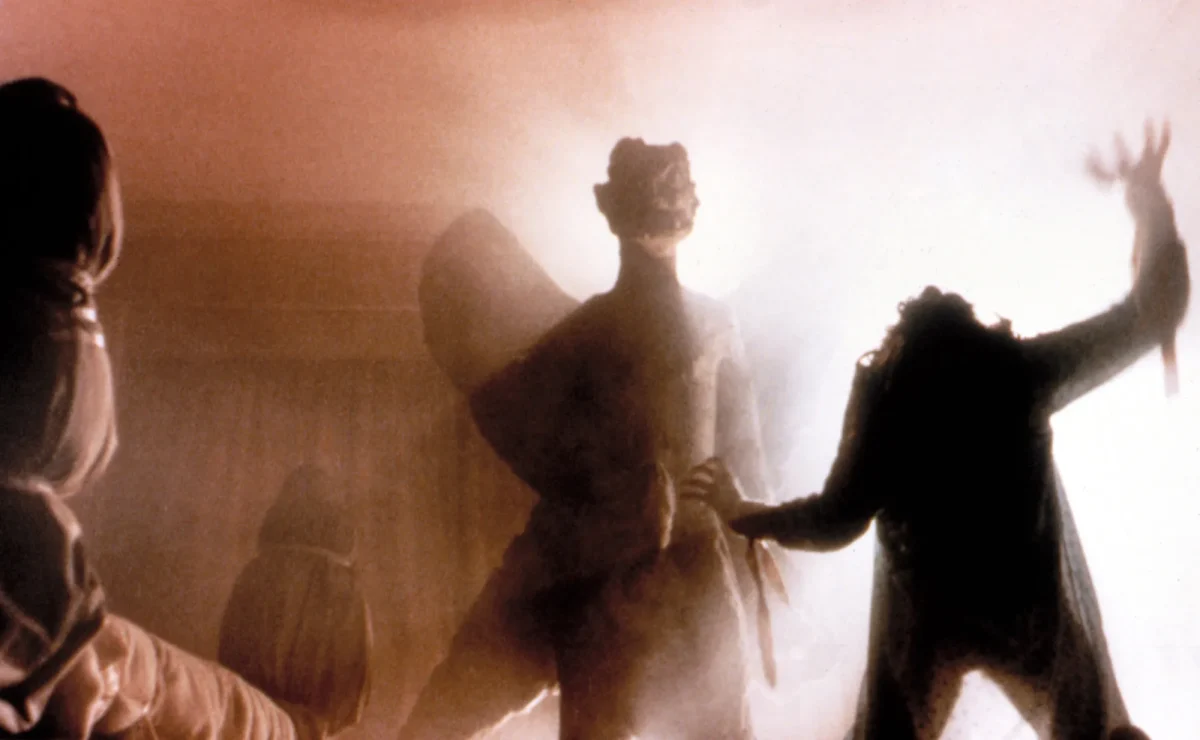I once had someone tell me that I shouldn’t watch horror films because they would influence me and fill my head with evil. They asked me how I, as a lifelong horror fan, could possibly enjoy films that contained such dark content. I always found this way of thinking to be faulty; in all the horror films that I had consumed in my life, I almost never walked away with the message of condoning evil.
There is a stigma that we, as Christians, should run and hide from the horror genre. It follows that we should turn our cheek on things that appear obscenely violent and explicit, ensuring all the content we consume is overtly wholesome with the intention of protecting our moral character from infiltration of sinister values. But if we look at the broken world around us, we are confronted with evil daily. We see it on the news, in our nations, communities, families, relationships and even within ourselves. Books, films and television offer a kind of intellectual enrichment by allowing us to experience these things vicariously and then apply their principles of good to our own lives.
This is what the horror genre generally aims to do: it explores what happens when ordinary people come face to face with pure evil. Do they stand up for one another, fight for what is good, or do they succumb to it? All of these scenarios are allegorical to the daily struggle of simultaneously bearing God’s image and being a sinner.
Christians shouldn’t avoid these questions. Our entire faith journey is dedicated to discerning right and wrong and glorifying God in an imperfect world. I argue that, as believers, we have something to gain from the horror genre.
GOOD VS. EVIL IN THE BIBLE & HORROR
Romans 12:21 tells us: “Do not be overcome by evil, but overcome evil with good” (NIV). This implies that though we will be faced with evil in many forms, we have been commanded not to ignore it but to overcome it with good. Turning a blind eye to anything that appears inherently evil neither reflects our life nor teaches us how to combat evil when we must confront it. Scripture points out that spiritual warfare (exorcisms, possession, demonic activity) can also be present here on earth, and horror films give us an opportunity to be reminded of this reality.
Similarly, it is apparent in Isaiah 45:7 that God also created darkness: “I form light and create darkness; I make well-being and create calamity; I am the Lord, who does all these things” (ESV). This might seem alarming, as how could our God, who is good, also have created evil? This does not imply that God causes evil, but that despite the evil and darkness in the world, his redemptive powers have no bounds. Some interpretations suggest that God allows evil because he is all-powerful, but good can always triumph through Him. This isn’t to say that we should enjoy evil things, but by seeing how characters in horror films battle evil, we can learn that we can also overcome darkness, and have confidence that mankind has the power to do so in God.
The very heart of the Bible is about good versus evil in all of its forms, such as disaster, violence, sin and temptation. We experience various levels of darkness every day, and God does not always shield us with His protective hand. He tells us that through our faith in Him, we can resist evil and do good. So why avoid portrayals of such in horror films?
Demonstrations of good versus evil in the horror genre aren’t always explicitly religious in nature; however, spiritual warfare is a prevalent theme. Whether or not the film has religious grounds to its narrative, they are generally applicable to the theological battle of good vs. evil.
OSGOOD PERKINS’ “LONGLEGS” 2024
Take Osgood Perkins’ “Longlegs” (2024) for example, a film that is overtly theological. In this horror mystery, FBI agent Lee Harker (Maika Monroe) investigates a serial killer known as Longlegs (Nicolas Cage), suspected of orchestrating murders of entire families for over three decades. As she investigates him, she learns that Longlegs not only worships Satan but that he somehow harnesses Satan’s power and brings it into families’ homes through porcelain dolls he designs. The evil forces within the dolls influence the family and cause them to wreak violence on themselves. The film concludes with Lee intervening with Longlegs’ murderous plans and saving his final victim, though she is unable to destroy the last Satanic doll and leaves it behind in the family’s home.
What does this story mean from a Christian perspective? First, we could deduce that this implies that Satan works on the individual level, seeking to destroy people via influence rather than overcoming the world as a whole. It is also allegorical for how Satan can enter homes and families, places that should be safe. This film does not promote evil as good, nor does it aim to exhort evil on its viewers. In fact, its message is quite the opposite. God is good, and the worship of Satan leads to internal and external destruction.
Secondly, we know that Lee had to leave the Satanic doll in the family’s home. We could see this as a reflection of the fact that Satan is present here on earth — and even if he is present here, we can still overcome him through the grace of God. We do not have to terminate evil in order to thrive; we can thrive and be Christ-like despite its attempts to harm our moral character. This ties back to Isaiah 45:7 and how God allows light and darkness to coexist. Despite the presence of evil on earth, we have the power to do good through God.
This is an example of a film that is explicitly theological in nature, and many classic and well-regarded horror films do not contain prominent Christian themes. However, they can still be allegorical to the gospel.
JOHN CARPENTER’S “THE THING” (1982)
One example is John Carpenter’s “The Thing” (1982). Though inspired by the tensions of the Cold War in the latter half of the twentieth century, we can also view it through a Christian lens. In “The Thing,” an unknown specimen is brought to an American research outpost in Antarctica. The creature infiltrates the bodies of the residents and impersonates them so that they are indistinguishable from aliens and humans. Once the men discover what is happening, they begin becoming fearful of one another and chaos ensues.
From a Christian perspective, we can view this as allegorical to sin and evil influence. Evil is not always apparent; in fact, we all know that temptation almost always disguises itself as good and enjoyable. Being Christian requires a high level of discernment, especially when navigating a secular environment. The world does not cater to what we need to do as Christians; rather, we must learn to have a high level of self-awareness of what we’re engaging in. In “The Thing,” evil enters the bodies of humans and seeks to destroy those around them, trying to come off as something perceivably safe and familiar. Similarly, this could be metaphorical for the biblical concept of corporate solidarity: our sin impacts others, whether it is public or private. Therefore, we must try to be morally consistent in all settings.
HOW TO BE MINDFUL WHEN WATCHING HORROR
Not all horror films succeed in condemning evil and condoning good. Over the years, a variety of horror films have shown to be gratuitously violent and explicit for sheer entertainment. Some have also been harmful to the Christian religion.
The “torture porn” trend in early 2000’s horror, as seen in James Wan’s “Saw” franchise, utilized violence and gore to shock its audience. It’s obvious that horror films almost always contain violence of some sort, but how do we discern when that violence is for pure entertainment or has a greater message to share?
Similarly, Ti West’s 2024 film, “Maxxxine” contained extremely offensive Christian stereotypes with little to no regard for Christian viewers. While these characters were most likely inspired by figures and movements throughout history who have claimed to be Christian and then manipulated and abused Scripture to fulfill their extremist agenda, the film ultimately failed to address this. It portrayed Christians as inherently violent and discriminatory, being completely insensitive to the fact that there would be believers in its audience.
This isn’t always apparent to viewers, but if we view horror through a Christian lens and with God’s Word in mind, we can analyze how the forces of good function in the characters in the plot as well as what role evil is playing. Is the evil intended to bring out the good in others, or is it being exploited simply for the fun of it?
However, even if evil does “win” in the conclusion of a horror film, that doesn’t mean that the creators are avidly promoting evil. We know as Christians that sometimes evil does win; tragedies and atrocities are rampant throughout our history. But we can analyze how and why characters fall and how we can avoid this in our own daily struggles of temptation.
That being said, Christianity often is explicitly represented more properly in horror through spiritual warfare. Satan, demons, evil forces and church imagery have been prominent in classic and modern horror films. This isn’t because film creators always believe they contain entertainment value, it is sometimes because good vs. evil is a very biblical concept.
William Friedkin’s 1973 “The Exorcist” is likely the most well-regarded example of such. When first released, the notion of demonic possession not only within a family home but within a young girl sent some viewers into an emotional tailspin, with instances of fainting and even vomiting in the audience. This is not because the film was gratuitously violent and stomach-churning, but it played on real fears within the audience.
To be fair, you as a viewer should probably draw the line at films that are producing a rather uncomfortable visceral reaction. But the point is that these fears are intense for us because they’re real to us, and to watch a film with spiritual warfare does not mean that the film will exert evil over you. Horror often draws from biblical concepts and teaches us that good can overcome evil, even when it enters somewhere as close to the heart as the home.
CONCLUSION
Christians do not need to watch horror — nor do they somehow lack the ability to discern good from evil if they don’t watch it. Each person knows what their mental and emotional capacity is for the intensity of content they consume. However, we don’t have to run from horror either. It has something to teach us, and as Christians, we know that many of the themes in this genre are all too familiar to us.
The Bible teaches us that evil is present here on earth, both within our communities and within ourselves. Despite this, God is good and there is nothing we cannot rise above through Him. Horror can — and often does — have the same message. Similarly, one could argue that good vs. evil is seen throughout all genres of films; however, it is portrayed at a much higher intensity in horror.
The battle of good vs. evil is at the heart of the Bible and at the heart of horror films, and so when viewing it through a theological lens, we could see it as a wholly Christian genre. We do not have to fear horror films; we have lessons to gain from them.






